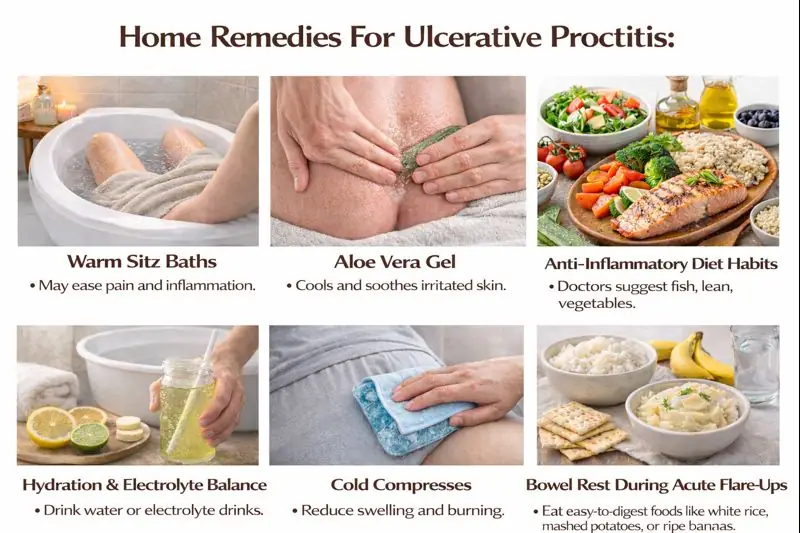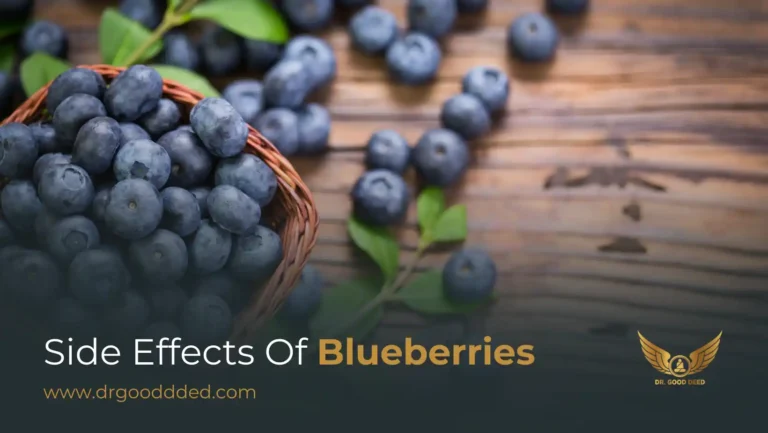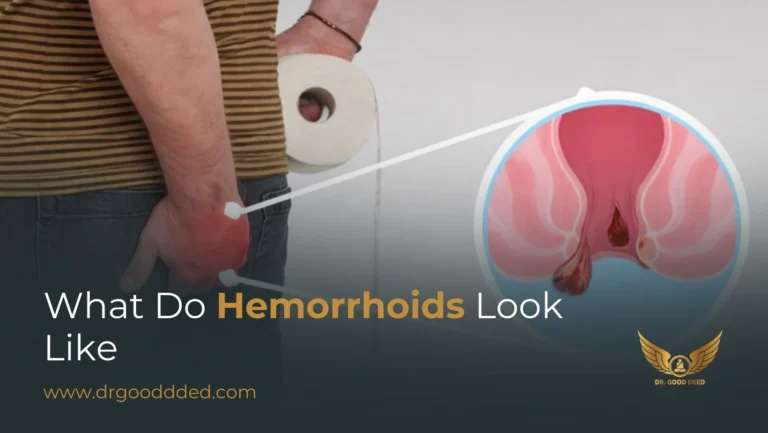Natural remedies for ulcerative proctitis focus on easing rectal pain, bleeding, and urgency while you still follow medical treatment. Ulcerative proctitis is a form of ulcerative colitis where only the rectum is inflamed. Inflammation causes swelling, tiny sores, and bleeding in the lining of your rectum.
Doctors agree that rectal 5-ASA medicines and other drugs remain the main treatment for this condition. You can then add natural remedies for ulcerative proctitis to reduce pain, support healing, and improve daily comfort. You also need to know that research on many natural options is still limited, and results differ from person to person.
Some people also use supplements for ulcerative proctitis or herbal remedies for ulcerative proctitis . These need extra care because they can interact with medicines. Any step you take should support, not replace, the plan you and your gastroenterologist set.
Home Remedies For Ulcerative Proctitis
Home remedies for ulcerative proctitis are simple, day-to-day steps that you can use along with your prescribed drugs. Many patients report real relief from them, although strong research is still limited in some areas.
Used wisely, natural remedies for ulcerative proctitis at home can reduce burning, protect sore skin, and help your rectum rest during a flare.
Warm Sitz Baths For Pain And Inflammation
A sitz bath means you dip your bottom and hips in a small tub of warm water. Doctors often advise this for anal pain and rectal inflammation.
Warm water helps blood flow in the area. Better blood flow can ease muscle spasms and reduce pain. It also cleans gently when toilet paper hurts. This makes sitz baths one of the most useful natural remedies for ulcerative proctitis during flares.
You can sit in warm water for about ten to fifteen minutes, two or three times per day. Use plain water. Avoid soap, bubble bath, or strong cleaners, because they can sting the skin.
Soothing Effects Of Aloe Vera Gel (Topical)
Aloe vera gel cools and calms irritated skin. Small clinical studies suggest that aloe taken orally can lower inflammation in ulcerative colitis. For ulcerative proctitis, people most often use aloe on the outer anal skin to relieve burning and itching.
Choose a product that is close to pure aloe and free of alcohol or strong fragrance. After a bowel movement, you can rinse gently with lukewarm water, pat dry, and then apply a thin layer of gel. This simple step often becomes part of a personal list of natural remedies for ulcerative proctitis .
Do not push aloe gel inside the rectum unless your doctor tells you to. Oral aloe may also help some patients, but the research is mixed, and doses vary by person and condition.
Anti-Inflammatory Diet Habits
Food does not cause ulcerative proctitis by itself, but it can trigger symptoms. Large reviews show that diet patterns rich in processed meat and unhealthy fats can be linked to worse inflammatory bowel disease. Plans rich in fish, gentle fiber, and plant foods may support the gut lining.
For you, an anti inflammatory eating pattern means:
- Eat small, regular meals.
- Choose cooked vegetables instead of raw during flares.
- Pick lean protein such as eggs, chicken, tofu, or fish.
This way of eating works well with natural remedies for ulcerative proctitis because it reduces stress on the inflamed rectum. You will fine-tune your own plan by watching which foods help or hurt, which we cover further under foods to avoid in ulcerative proctitis .
Hydration And Electrolyte Balance
Every loose or bloody stool means you lose water and salts. Fact sheets from major IBD groups warn that poor hydration can worsen fatigue and delay healing.
During a flare, you can sip plain water all day rather than taking large amounts at once. Oral rehydration solutions can help when your stools are frequent. Pick products low in extra sugar if sugar worsens your diarrhea.
Good hydration supports all natural remedies for ulcerative proctitis because your colon cells need water and minerals to repair the inflamed lining.
Using Cold Compresses For Symptom Flares
Heat calms cramps. Cold helps when the area feels hot and swollen. You can wrap a cold pack in a soft cloth and place it on the outer anal area for short intervals.
You should keep each session short to protect the skin. Ten minutes on, then a break, often feels best. It helps many people control the sharp, burning stage of a flare. It works well beside sitz baths in a larger plan of natural remedies for ulcerative proctitis .
Bowel Rest During Acute Flare-Ups
Bowel rest is giving your gut lighter work for a short time, not a long fast. Expert groups suggest lower fiber or liquid diets during strong flares of ulcerative colitis to ease pain and urgency.
For you, bowel rest can look like this for a day or two during a bad flare.
- Choose soft, simple foods you tolerate, such as white rice, mashed potatoes, or ripe bananas.
- Avoid big meals and heavy snacks late at night.
Long fasts can cause weight loss and malnutrition, so they are not safe natural remedies for ulcerative proctitis . Any major diet limit should be checked with your doctor or a dietitian who knows inflammatory bowel disease.
Natural Treatment For Proctitis
Natural treatments for proctitis are lifestyle steps that work hand in hand with medicine. Guidelines from expert groups for ulcerative colitis highlight the role of stress control, sleep, and activity, along with drugs, to keep symptoms down.
Lifestyle Modifications For Flare Control
Your gut likes routine. Irregular meals, skipped sleep, and rushing through mornings can raise stress and trigger urgency. You can help yourself when you:
- Eat at about the same times each day.
- Give yourself enough time for a calm bowel movement in the morning.
- Avoid long sitting on the toilet while using your phone, because that increases pressure on the rectum.
Stress-Management Techniques (Yoga, Meditation)
Stress does not cause ulcerative proctitis, but it can make symptoms worse through the gut-brain connection. Mind-body therapies such as relaxation breathing and mindfulness help some people with ulcerative colitis feel better and may reduce flare frequency.
You can sit in a quiet spot, place one hand on your belly, and breathe in slowly through your nose. You let your belly rise, hold for a count, then breathe out through your mouth. Doing this for five minutes twice daily can support your natural remedies for ulcerative proctitis plan more than you might expect. Gentle yoga stretches can play the same role if they do not cause pain.
Pelvic Floor Relaxation Exercises
The pelvic floor is the layer of muscles at the base of your pelvis. It controls the anus and helps you hold or pass stool. Many people with rectal pain tense these muscles without noticing. Over time, that constant squeeze can increase pain and make it harder to empty the rectum.
Pelvic floor therapists teach you how to relax these muscles. One basic start is to sit or lie down, breathe deeply into your belly, and as you exhale, imagine the muscles around your anus softening. You do not push; you simply release. That gentle focus, repeated often, fits well inside natural remedies for ulcerative proctitis because it reduces strain during bowel movements.
Reducing Trigger Foods And Habits
Diet studies show that no single food harms everyone with ulcerative colitis. What matters more is your personal trigger list. Keep a food and symptom diary so you can see patterns.
Common triggers include very spicy dishes, high-fat takeaway food, alcohol, heavy caffeine, and large portions late at night. You also look at habits like rushing, ignoring the urge to defecate, or frequent straining. When you remove or reduce these triggers, you strengthen your base of natural remedies for ulcerative proctitis .
Gentle Physical Activity To Reduce Inflammation
Regular, moderate exercise is linked with a better quality of life and may help control inflammation.
You do not need intense gym sessions. A brisk walk, easy cycling, or stretching for twenty or thirty minutes most days can help. During a strong flare, you keep activity short and gentle to avoid exhaustion. Even then, a slow walk around your home or garden still supports your natural remedies for ulcerative proctitis .
Sleep Quality And Gut Recovery
Poor sleep relates to more frequent and more severe inflammatory bowel disease flares. Good sleep is one of the most underrated natural remedies for ulcerative proctitis .
You help your gut rest when you go to bed at the same time each night, keep your bedroom dark and quiet, avoid large meals, alcohol, and high caffeine in the evening, and limit screens before bed.
If pain wakes you often, you should tell your doctor so that your medical plan can change.
Foods To Avoid In Ulcerative Proctitis
Diet advice must never be one size fits all. Still, big centers such as the Crohn’s & Colitis Foundation list common foods to avoid in ulcerative proctitis , especially during flares.
You combine that expert advice with your own diary results, and you use these food limits as part of your total set of natural remedies for ulcerative proctitis .
Spicy Foods And Irritants
Very spicy foods can irritate the inflamed rectal lining as they pass through your bowel. Chili sauces, hot curries, and extra pepper often lead to more burning and urgency. There is no rule that you must avoid all spices forever, but during a flare, it makes sense to remove these foods first and then test small amounts only when your gut is calmer.
Dairy And Lactose Triggers
Many people with inflammatory bowel disease also have lactose intolerance, which means they cannot break down the sugar in milk. That can cause gas, cramps, and diarrhea, which mimic ulcerative proctitis symptoms.
Because of this, doctors often suggest a short trial without regular dairy. You may still tolerate lactose-free milk or hard cheese.
High-Fat And Fried Foods
High-fat meals move slowly through your gut and can change bile acids in the colon. That can lead to more cramps and looser stools in people with ulcerative colitis.
Deep-fried snacks, fast food burgers, and heavy cream sauces are common problems. Replacing them with baked, grilled, or steamed options lowers the load on your bowel and supports other natural remedies for ulcerative proctitis, such as bowel rest and sitz baths.
Acidic Fruits And Juices
Citrus fruits and tomato products contain acids that can sting when the rectal lining is raw. Orange juice, lemonade, and tomato-based sauces often increase burning during bowel movements.
You may still manage peeled, non-citrus fruits such as ripe bananas, melons, and cooked apples. These tend to be gentler and can stay in your diet while you treat acidic foods as foods to avoid in ulcerative proctitis during flares.
Caffeine And Alcohol
Caffeine speeds up gut movement and can increase urgency. Alcohol can irritate the gut lining and worsen diarrhea. Major clinics therefore advise many patients with ulcerative colitis to reduce or avoid these drinks, especially when symptoms are active.
If you notice that coffee, energy drinks, or wine lead to more trips to the toilet, lowering or cutting these drinks becomes a targeted part of your natural remedies for ulcerative proctitis .
Ultra-Processed Foods And Additives
Ultra-processed foods tend to contain emulsifiers, thickeners, and preservatives. Lab and early human studies suggest that some of these additives may damage the gut barrier and change the microbiome in ways that are not helpful for inflammatory bowel disease.
Processed meats, instant noodles, packaged pastries, and many snack foods fall in this group. You do not need a perfect diet, but each swap toward simple, home-cooked meals gives your rectum a calmer environment and makes other natural remedies for ulcerative proctitis more effective.
Supplements For Ulcerative Proctitis
Many people look at supplements for ulcerative proctitis as extra support besides their regular drugs. You should always see these as add-ons. They do not replace medical treatment.
Used wisely with your doctor, some supplements can support gut healing, energy, and immunity.
Omega-3 Fatty Acids (EPA/DHA)
Omega-3 fatty acids are healthy fats found in oily fish and some plant sources. Trials in ulcerative colitis suggest that EPA and DHA can lower certain inflammation markers and may help some patients stay in remission, but results are not consistent.
Doctors sometimes suggest omega-3 as part of supplements for ulcerative proctitis , especially if you eat little fish. The exact dose depends on your age, weight, diet, and other health issues. You should talk with your gastroenterologist, because very high doses might raise bleeding risk when you already have rectal bleeding.
Probiotics & Prebiotics For Gut Balance
Probiotics are live, helpful bacteria. Prebiotics are fibers that feed them. In ulcerative colitis, mixtures like VSL#3 and similar products helped some patients reach or keep remission, without major safety problems.
For you, a well-studied probiotic may support natural remedies for ulcerative proctitis by improving the balance of gut bacteria, easing gas, and lowering stool frequency. Effects vary a lot between people. Start low, go slow, and always ask first if you take immune-suppressing drugs.
Vitamin D For Immune Regulation
Vitamin D is a hormone-like vitamin that helps the immune system and bone health. Many people with inflammatory bowel disease have low vitamin D levels. Studies show that correcting low levels can support better disease control, although it is not a stand-alone treatment.
Doctors usually check your blood level and then decide the right supplement amount. This makes vitamin D one of the safer supplements for ulcerative proctitis , as long as lab tests guide the plan and you do not take large doses without monitoring.
Curcumin (Turmeric Extract)
Curcumin is the main active part of turmeric. Several controlled trials in mild to moderate ulcerative colitis show that curcumin, when added to mesalamine, helped more patients reach remission compared with mesalamine alone, with few side effects reported.
Because of this, many experts now see curcumin as one of the most promising supplements for ulcerative proctitis , always as an add-on to standard care. The best dose and form vary, and low-quality products may not absorb well, so you should select a brand together with your doctor or pharmacist.
Glutamine For Intestinal Healing
Glutamine is an amino acid that gut cells use as a fuel source. Research in ulcerative colitis is small, and results differ, but some data suggest it may help repair the intestinal barrier in certain patients who are malnourished or under high stress.
Doses change based on body size and kidney function, so this supplement should always be guided by a clinician or dietitian.
Boswellia Serrata
Boswellia is a tree resin also called frankincense. Small human trials in ulcerative colitis found that Boswellia extracts improved symptoms and stool quality in some patients, sometimes with results similar to standard drugs, although the studies were small and short.
Lab studies show that Boswellia may protect the gut barrier and lower specific inflammation signals. Because of this, some doctors consider it one of the more serious supplements for ulcerative proctitis , but they still stress that evidence is limited and long-term safety data are not complete.
Herbal Remedies For Ulcerative Proctitis
Herbal remedies for ulcerative proctitis may help, but they can also cause reactions or interact with your drugs. Always treat them with the same care you give prescription pills.
Aloe Vera (Oral Anti-Inflammatory Benefits)
When taken by mouth, aloe vera gel has shown some benefit in mild to moderate ulcerative colitis in a controlled trial, with more patients reaching improvement than with a placebo.
For you, oral aloe might support natural remedies for ulcerative proctitis by calming the colon and rectum. The product must be made for drinking, with laxative parts removed. Dose and duration differ by case, so you should involve your doctor before adding it.
Slippery Elm For Mucosal Protection
Slippery elm bark forms a thick, smooth gel when mixed with water. This gel can coat irritated tissue. Traditional use and small reports suggest it may ease burning and stool urgency in some people with bowel disease, but strong clinical trials are still lacking.
It can affect how your body absorbs other medicines; you must check timing and safety with your care team.
Chamomile For Inflammation
Chamomile is known for its calming effect on both mind and body. Herbal mixes that contain chamomile have shown symptom relief in some ulcerative colitis studies, although it is hard to separate chamomile from the other herbs in those products.
A warm chamomile tea in the evening may support stress control and gut comfort. In some cases, doctors may also allow chamomile sitz baths. You should avoid it if you have a ragweed allergy.
Calendula Suppositories For Rectal Irritation
Calendula, or marigold, has long been used on skin wounds. Rectal suppositories with calendula aim to bring those soothing features to the rectal lining. Research in ulcerative proctitis alone is very limited, so doctors mainly rely on traditional use and small case reports.
If your doctor agrees, you might trial calendula products as part of herbal remedies for ulcerative proctitis for local soreness and minor bleeding. You should stop right away if pain, rash, or discharge worsens.
Witch Hazel Pads For Local Relief
Witch hazel is an astringent plant extract. It is often used for hemorrhoids to reduce swelling and itching. While not specific to proctitis, witch hazel pads can soothe the anal skin when frequent stools and wiping cause irritation.
Used after gentle cleansing, they can fit with other natural remedies for ulcerative proctitis to protect the area around the anus. You should avoid harsh rubbing and stop if stinging increases.
Marshmallow Root For Gut Soothing
Marshmallow root, like slippery elm, makes a soft gel that can coat the digestive tract. Evidence is mostly traditional and from lab work, so its role in ulcerative proctitis is not fully clear.
Some people sip a cooled marshmallow infusion to lower burning and acidity. If you choose to use it, keep your doctor informed so it can be safely placed within your broader herbal remedies for ulcerative proctitis plan.
Long-Term Natural Management Plan
A long-term plan uses natural remedies for ulcerative proctitis side by side with your medical care so that symptoms stay lighter and flares become less frequent.
Maintaining Food/Symptom Diary
A daily diary helps you see links that your memory might miss. You write down what you eat, your stress levels, your sleep, your stools, and any supplements for ulcerative proctitis or herbs you take.
After a few weeks, you can see personal foods to avoid in ulcerative proctitis , your most helpful herbal remedies for ulcerative proctitis , and patterns around stress or late nights. This record gives your doctor a sharper view of your disease.
Gradual Reintroduction Of Foods
When a flare settles, you may want to widen your diet. You can do this in small steps. You add one food at a time and watch your diary for three days.
This careful method helps you test how much your gut can handle. It stops you from blaming a whole meal when only one food is the true trigger.
Routine Follow-Ups To Monitor Condition
Ulcerative proctitis can sometimes extend higher into the colon. Because of this, you need regular follow-up with your gastroenterologist. They use scope exams, blood tests, and stool tests to track inflammation and watch for problems like anemia.
You should always tell your doctor about new supplements for ulcerative proctitis , diet changes, or herbal products so these can be recorded and checked for safety.
Combining Natural Options With Medical Care Safely
The strongest results usually come when standard therapy and natural remedies for ulcerative proctitis move in the same direction. Your medicines control active disease. Your diet, sleep, movement, and herbs support healing, stress relief, and comfort. Any time you want to cut a drug or raise a supplement, you should talk with your doctor first.
FAQs
What Is Ulcerative Proctitis, and How Does It Differ From Ulcerative Colitis?
Ulcerative proctitis means inflammation is limited to your rectum, while ulcerative colitis affects a longer part of your colon. You still need medical care, yet natural remedies for ulcerative proctitis can support comfort and control.
What Are The Earliest Signs Of A Proctitis Flare?
Early signs usually include fresh blood on toilet paper, mucus, urgency, and a feeling that stool is stuck. When you see these, you adjust medicines and restart natural remedies for ulcerative proctitis promptly with your doctor.
How Long Do Typical Proctitis Flares Last?
A flare can last days or weeks. Length depends on how fast you treat it, how active the inflammation is, and how closely you follow both drug therapy and natural remedies for ulcerative proctitis at home.
Can Diet Alone Control Ulcerative Proctitis?
Diet shapes inflammation and symptoms, yet it rarely controls disease on its own. You usually need medicines plus natural remedies for ulcerative proctitis, smart foods to avoid in ulcerative proctitis, and follow up with your doctor.
Which Foods Most Commonly Trigger Symptoms?
Common triggers include very spicy food, high fat fried meals, a lot of alcohol, strong coffee, and many ultra-processed snacks. Foods to avoid in ulcerative proctitis may differ for you, so a diary is vital.
Is Fasting Or Bowel Rest Helpful During A Flare?
Short, gentle bowel rest with softer foods may ease pain, but long or strict fasts can be risky. It is safer to plan this with your doctor while you keep using natural remedies for ulcerative proctitis .
Are Probiotics Safe And Effective For Proctitis?
Many probiotics are safe for most people and may reduce rectal bleeding in mild ulcerative colitis. You still should speak with your doctor before using probiotics as natural treatment for proctitis or alongside immune-suppressing drugs.
Which Supplements Support Mucosal Healing?
Curcumin, omega-3 fatty acids, selected probiotics, and vitamin D show the most promise, yet research is still growing. A clinician can help you choose supplements for ulcerative proctitis that match your blood tests and medicines.
Can Omega-3 Fatty Acids Reduce Rectal Inflammation?
Omega-3 fatty acids may reduce gut inflammation in some patients, but findings do not agree in every trial. They can still form part of natural remedies for ulcerative proctitis if your doctor feels the benefits outweigh the risks.
When Should I See A Doctor For Worsening Symptoms?
You should seek urgent care if bleeding increases, you pass many bloody stools, you get severe pain, fever, or rapid weight loss, or if natural remedies for ulcerative proctitis and regular drugs stop working as usual.












Leave a Comment